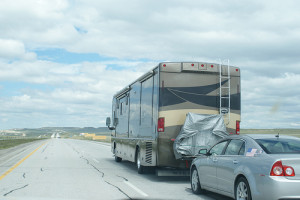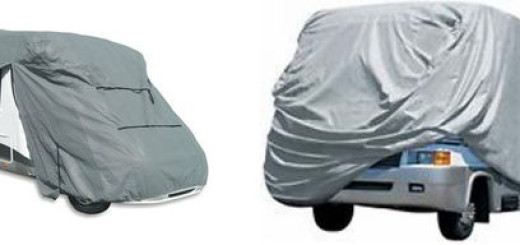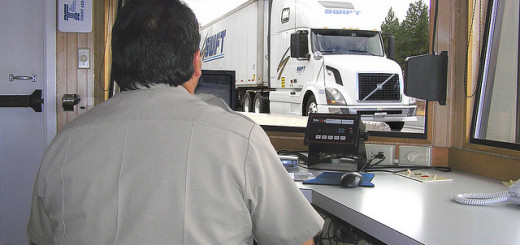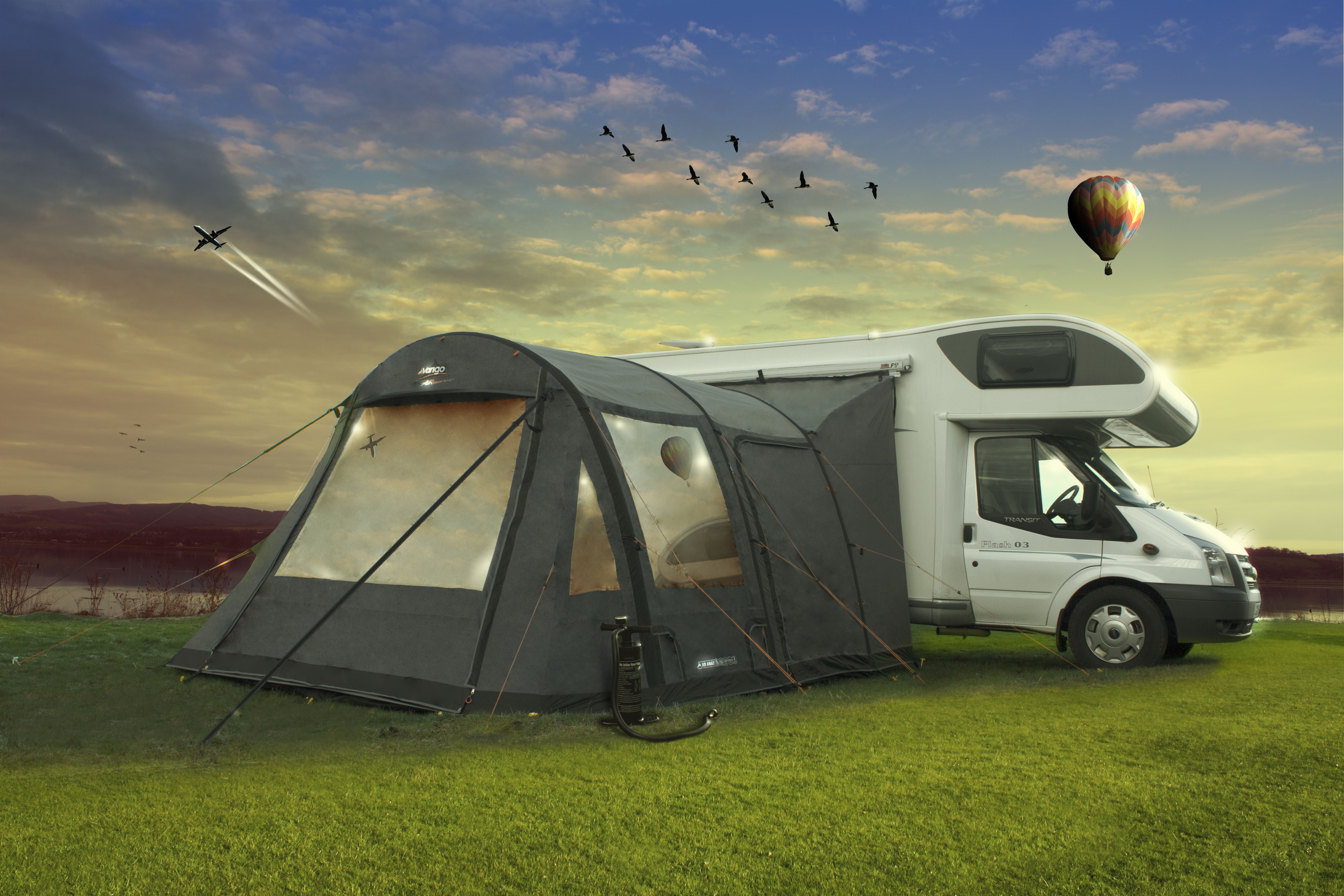How Much Can My Motorhome Tow?
Question: How much can my motorhome tow?
My motorhome has a trailer hitch, and I’m thinking about towing a boat this summer. I have a pretty small motorhome with good visibility, so I’m confident that I’ll be able to launch the boat with the motorhome, but I’m not sure about towing. How can I tell if my motorhome will be able to safely tow my boat? I’m also thinking about towing a car later in the year, so I’m curious if my motorhome will be able to tow my car, or if it’s too big.
Answer:
There are a lot of different factors that can affect how much your motorhome can safely tow, but there are five important numbers that will give you a pretty good idea. The first number you’ll want to find is the hitch class that your rig is equipped with. This isn’t technically a number, but hitch classes are numbered in North America (from I to IV, although some manufacturers offer a non-standardized “class V” hitch that isn’t specified in SAE J684.) Your hitch class will give you an upper limit of how much you can tow because each class is rated to handle a certain amount of weight.
Hitch Classes and Capacities
| Class | Tongue/Hitch Weight | Maximum Towing Weight |
|---|---|---|
| Class I | 100 - 200 lbs. | 1,000 - 2,000 lbs. |
| Class II | 250 - 350 lbs. | 2,500 - 3,500 lbs. |
| Class III | 350 - 500 lbs. | 3,500 - 5,000 lbs. |
| Class IV | >500 lbs. | 7,500 - 10,000 lbs. |
While hitch class is a good indication of how much your motorhome can tow, it doesn’t tell the whole story. In order to find out the actual amount of weight you can handle, you need to look at two other numbers: the motorhome’s gross combined weight rating (GCWR) and the actual gross weight of the motorhome. You can also look at the towing rating to get an idea of how much you can tow, but that’s really better for comparison purposes when you’re shopping than it is to determine how much you can actually tow in real world conditions.

Some motorhomes are better at towing than others, and there a few key numbers you’ll need to look at.
Gross Combined Weight Rating
The term GCWR refers to the total safe weight of everything in the trailer/towing vehicle system, and it’s a static rating that’s provided by the manufacturer. Some RV manufacturers provide this information on their websites, others have it in their brochures, and they should all include it in their users manuals. So if you’re trying to figure out how much you can tow with a rig that you already own, the first place to look is in your manual. If you’re still shopping for a rig, and you can’t find the GCWR for a particular model either here or on the manufacturer’s website, then you can contact the manufacturer directly (or a local dealer) to find out.
Essentially, the GCWR is the gross vehicle weight rating (GCWR) of the motorhome plus the gross trailer weight rating (GTWR) of the heaviest fully-loaded trailer it can safely tow. This is why class A motorhomes can typically tow more than class C motorhomes of similar length, since the difference between the dry weight of a class C rig and its GVWR is typically less than you see in class A rigs.
How Much Does a Motorhome Weigh?
The easiest way to find out how much your motorhome can tow is to subtract your GVWR from your GCWR. That will, theoretically, give you the maximum amount you can tow with a fully-loaded motorhome. However, your motorhome probably doesn’t weigh exactly the same as its GVWR when it’s all loaded up for a camping trip. Depending on your rig, your gear, and how many people you’re bringing along, you may be way under the GVWR or even over it.
If you want to calculate the actual weight of your rig, you’ll need to start with the unloaded vehicle weight (UVW). This number is also referred to as the “dry weight” by a lot of manufacturers, as it’s roughly how much the rig weighs when it ships from the factory. It’s also helpful to remember that GVWR – UVW = the maximum amount of weight you can safely haul inside your rig.
So if you know the dry weight of your rig, you’ll have to make a list of everything that you typically load into it before hitting the road. That includes things like:
- gas
- water
- passengers
- food
- clothes
- and everything else
If you take a little time, you can get pretty close to the actual weight of your rig by tallying up everything that you load into it. However, the easiest way to find out how much your motorhome weighs is to actually load it up and weigh it.
Where Can You Weigh a Motorhome?

If the enforcement officer flips the scale readout up, you may be able to check your weight even if a weigh station is closes.
In order to determine the actual weight of your rig, you’ll need to find a scale that’s technically designed to weigh commercial trucks. One common place to find these scales is on freeways, where there will often be weigh stations that commercial trucks are required to stop at. If you wait in line with the big rigs, you may be able to have your motorhome weighed. In some cases, you can also pull into a closed weigh station, stop your motorhome on the scale, and then look through the window of the kiosk to see the weight of your rig.
Other places that need to weigh big trucks also have scales that you may be able to use. Check waste transfer facilities, water treatment facilities, gravel yards, and other similar locations in your vicinity to see if any of them will allow you to use your scale next time you’re ready to go camping. In a lot of cases, you’ll be able to find a place that will allow you to use their scale free of charge.
Towing Rating
Manufacturers often provide a “towing rating” that says how much you can safely tow with a particular vehicle, which is usually based on the dry, or curb, weight of the vehicle, plus a driver. In order to find out how much you can actually tow, you can use that as a hard limit and then take a look at your GCWR and the actual loaded weight of your rig.
If you subtract the weight of your motorhome from its GCWR, the resulting number will be how much you can safely tow. If that number is somehow higher than the towing rating (which sometimes happens with large vehicles), then stick with the towing rating. If, however, it’s lower than the towing rating, stick with the lower number. Of course, if either of those numbers is higher than the maximum capacity of your hitch class, you’re stuck at that lower number.
Other Concerns when Towing with a Motorhome
In some cases, you may have trouble towing a heavy boat, utility trailer, or car, even though it doesn’t put you up over your GCWR. If you suffer from overheating issues, you may need a heavy duty radiator or an additional electric fan to help deal with the additional strain. You may also need to add an external transmission cooler if the transmission is overworked. Issues like these are more likely to appear when towing up and over mountain passes than they are when you stay on the flat, and if you’re in the market for a rig that you intend to tow things with in those types of circumstances, you may benefit from the added torque that you get from diesel motorhomes. (In which case you might want to look at a diesel class B motorhome, or a small diesel pusher.)







